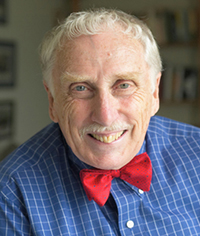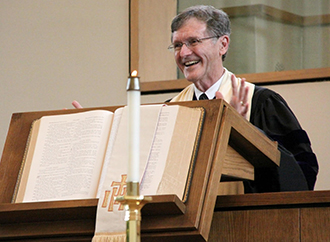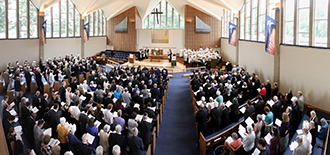By Robert Dilday
 Laughter, not tears, prevailed at a memorial service July 18 for fiery religious liberty advocate James Dunn, who died two weeks ago at 83.
Laughter, not tears, prevailed at a memorial service July 18 for fiery religious liberty advocate James Dunn, who died two weeks ago at 83.
A packed sanctuary at Knollwood Baptist Church in Winston-Salem, N.C. — the congregation Dunn attended along with his wife, Marilyn, who survives him — and others listening to a live stream on several web sites heard stories of what one speaker called a “Baptist folk hero.”
What emerged was a picture of a man passionate for religious liberty, separation of church and state and social justice who also invested his life in thousands of other people.
“You think you have personal stories about James? He had plenty of stories about most of you,” said Bill Leonard, the James and Marilyn Dunn Professor of Baptist Studies at Wake Forest University School of Divinity. “When James was talking to you, it was like you were the only person in the room.”
 Dunn was “our own Baptist folk hero, and what’s more important — once he met us, he never forgot our name.”
Dunn was “our own Baptist folk hero, and what’s more important — once he met us, he never forgot our name.”
For nearly two decades Dunn, a native Texan, was executive director of the Washington-based Baptist Joint Committee for Religious Liberty, and for 12 years prior to that executive director of the Texas Baptist Christian Life Commission. After retiring in 1999, he moved to Winston-Salem to teach at Wake Forest’s Divinity School.
“James Dunn was committed to Jesus Christ, to Marilyn McNeely Dunn, to Baptist ways of being church, to ecumenical and interfaith pluralism, to the ceaseless struggle for religious liberty, to his Texas heritage and to the Democratic Party — all in that order, except on election day,” said Leonard.
 “His most famous declaration — ‘Ain’t nobody going to tell me what to believe except Jesus’ — got him into huge trouble on the right and the left of center. The message that God’s kingdom — God’s new day — has come near to you, told by the likes of Walter Rauschenbusch, Dorothy Day and Gardner Taylor shaped James’ radical Christianity, centered in personal transformation, communal justice and compassion for the sick.”
“His most famous declaration — ‘Ain’t nobody going to tell me what to believe except Jesus’ — got him into huge trouble on the right and the left of center. The message that God’s kingdom — God’s new day — has come near to you, told by the likes of Walter Rauschenbusch, Dorothy Day and Gardner Taylor shaped James’ radical Christianity, centered in personal transformation, communal justice and compassion for the sick.”
Brent Walker, who succeeded Dunn as executive director of the BJC, said his predecessor “loved people, thousands and tens of thousands of friends and fans, and hundreds of seminary students, who he called his ‘young-uns.’”
“I heard him say many times, ‘I’m Dunn — D-U-N-N — but I’m not yet finished.’ How true that has always been. But now he is done and finished. And his legacy will live on in the Baptist Joint Committee, at the Wake Divinity School, in Knollwood Baptist Church and in every one of us. “
Wake Forest University School of Divinity will host a celebration of Dunn’s life and legacy this fall. Journalist and political commentator Bill Moyers — who Leonard called Dunn’s “dearest of his dearest friends” — will be keynote speaker. The date is yet to be announced.
